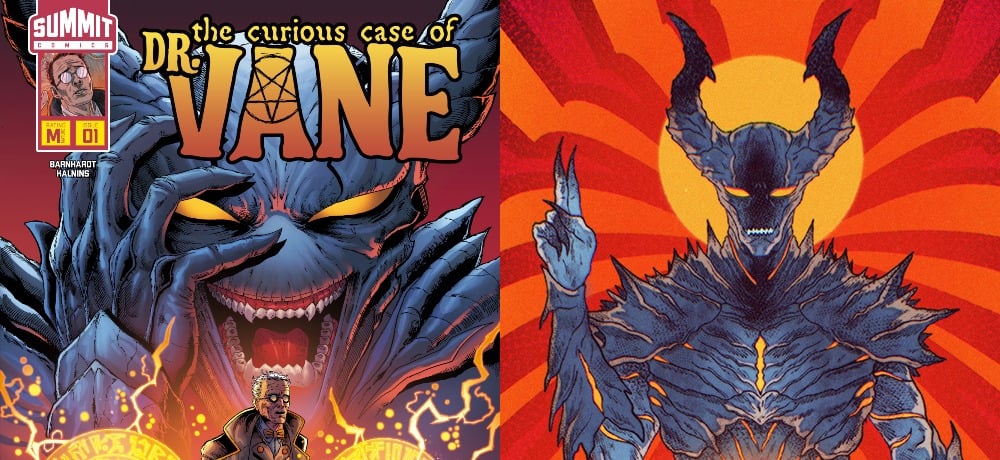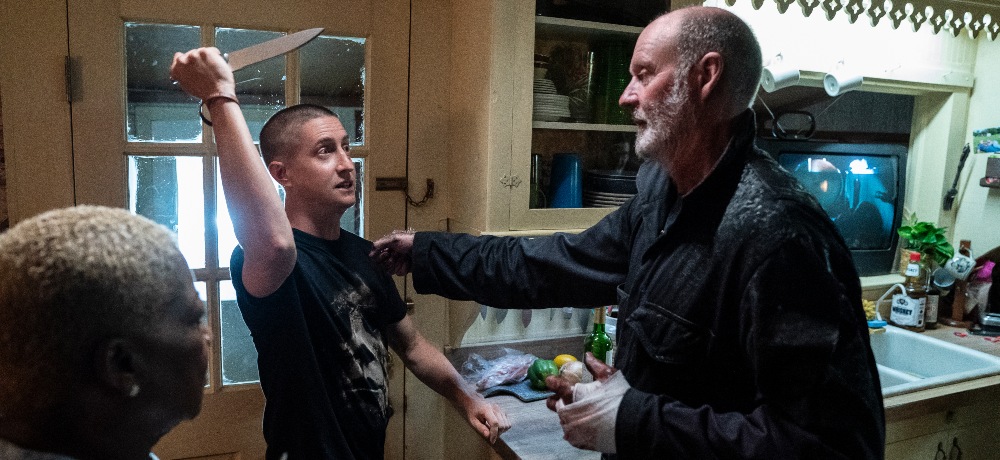






Tonight is the night, fiends! Michael Myers is set to slash his way back into the theaters (and on the Peacock streaming app as well) tonight as we’re now officially just a few hours away from the highly anticipated release of Halloween Kills. During a recent press day for the sequel, co-writer/director David Gordon Green discussed the timeliness of the sequel even though the movie’s release had been delayed for a year, as well as how intimidating it is to play around in the sandbox originally created by the legendary John Carpenter. Green also chatted about addressing the traumatic events of Halloween (2018) in this latest film, and the three essential elements that make up a successful Halloween film.
This film has a bit of a theme about misinformation and the way mob mentality negatively impacts a community. I was wondering if that was the game plan for you guys way back when you designed this trilogy, or was it something that came to mind through current events or through the news?
Well, we filmed it two years ago, so it's interesting to think about it with that perspective is that it was when we were finishing the film and headlines of similar subjects were starting to happen that we thought, “Oh, this is really relevant.” And then COVID happens and puts us on the shelf for a year, and now in a strange way with the public consciousness and the awareness and the conversations that people are having, I feel like, in a strange way, we've taken a genre slasher movie and it's landed in a time of some sort of cultural relevance that is coincidental, but is also fascinating as a filmmaker to be a part of those dialogues.
Can we talk about upping the ante with the violence in Halloween Kills, David? Because this movie really does get gnarly, to say the least.
Yeah, and it's also very subjective. In entering the film and in the script phase, we had no intentions of making a graphically violent movie. It was certainly ambitious and aggressive from a physical and stunt logistical level, but it wasn't until we were filming them in the sequences and figuring out where to place the camera and seeing how effective some of the makeup and killing effects were. We were so fortunate to work with great makeup and effects artists like Chris Nelson that, when we're in the editing room and we're navigating where the subtlety might live, all of a sudden the editor, Tim Alverson, and we just threw up our hands and said, “Subtlety is not this film.” Perhaps it will return, but it is not in a movie called Halloween Kills, so let's just have fun with it. Let's give the audience something to scream at and eat popcorn to and have a good time at the movies.
I wanted to ask, because so often in slasher franchises, we just kind of move on from movie to movie, and from kill to kill, and we don't really deal with the aftermath very often, especially from an emotional perspective. I was wondering if you could talk about addressing that in this film.
I do feel like as a writer and director, I'm drawn to making sure that there is an emotional core to these characters, and as abstract and chaotic as some of the violence might get and grotesque as it gets oftentimes, acknowledging that within the reality of these characters. There's a moment with Karen and Allyson on the staircase grieving for Allyson's father, Ray, who passed away earlier that same night. And I think moments like that where we acknowledge what the reality of the trauma is does help us feel the humanity underneath the surface of this movie monster.
Halloween has been around for about 40 years or so, and so when dealing with this trilogy, what were the elements that you really wanted to create that modernized it? And what were the things that were really essential that you still wanted to keep?
Well, I think the essential DNA comes down to three things: Michael Myers, Laurie Strode, and having a score from John Carpenter. So when you have those three elements, now we can have our creative muses, we can take our inspirations, we can travel wherever we want with a narrative because our mythology is in place with those three creative elements. And so, to me, it's just a wonderful playground to be able to take legacy characters from Carpenter's '78 film, some of the new characters that we created in our 2018 movie, and take them on an explosive journey through Haddonfield.
As far as the writing aspect, how does one look at something like John Carpenter's classic film and create a new path after all these other films have been made? To take us on a journey to where we're ultimately going to get a satisfying conclusion to Laurie's story—what's that process like?
Well, once you get over the intimidation of it, because those are some big shoes to fill, and realize that we have the support of a great team, from Jason [Blum] and our friends at Blumhouse, and all of our technicians that surround us, it's basically Danny McBride and I and a new writing collaborator on each of the three chapters of our trilogy, from Jeff Fradley, Scott Teems, Chris Bernier, and Paul Logan. And when we workshopped these scripts, we talked about the creative opportunities and the obstacles. You can always write yourself into a corner, and then you need someone to look to and say, "Okay, now how do we get out?"
And so whether it's Michael being trapped in the basement or Laurie being stabbed in the gut, these are dramatic tools that we've utilized for our narratives. And then we have to find solutions to evolve the story of all these characters and make these characters that are so iconic at this point that we, as viewers, as fans, as an audience, want to return to.
---------
Visit our online hub to catch up on our coverage of Halloween Kills!
[Photo Credit: Above photo by Ryan Green/Universal Pictures. © 2021 UNIVERSAL STUDIOS. All Rights Reserved.]